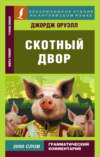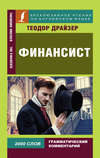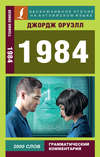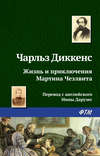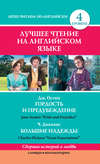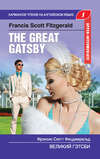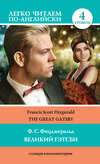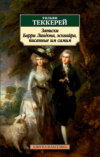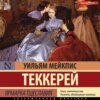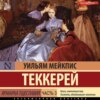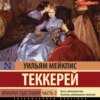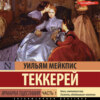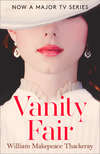Kitabı oku: «Ярмарка тщеславия / Vanity Fair», sayfa 2
4
Poor Joe’s panic lasted for two or three days; during which he did not visit the house, nor during that period did Miss Rebecca ever mention his name. She was all respectful gratitude to Mrs. Sedley, in a whirl of wonder at the theatre, where the good-natured lady took her. One day, Amelia had a headache, and could not go upon some party of pleasure to which the two young people were invited: nothing could induce her friend to go without her. “What! you who have shown the poor orphan what happiness and love are for the first time in her life – quit YOU?
Never!” and the green eyes looked up to Heaven and filled with tears; and Mrs. Sedley could not but own that her daughter’s friend had a charming kind heart.
As for Mr. Sedley’s jokes, Rebecca laughed at them with a cordiality which pleased and softened that good-natured gentleman. Once, in looking over some drawings which Amelia had sent from school, Rebecca suddenly came upon one which caused her to burst into tears and leave the room. It was on the day when Joe Sedley made his second appearance. Amelia hastened after her friend to know the cause of this and the good-natured girl came back without her companion, rather affected too. “You know, her father was our drawing-master, Mamma, at Chiswick, and used to do all the best parts of our drawings.”
“My love! I’m sure I always heard Miss Pinkerton say that he did not touch them – he only mounted them.”
“It was called mounting, Mamma. Rebecca remembers the drawing, and her father working at it, – and so, you know, she – ”
“The poor child is all heart,” said Mrs. Sedley.
“I wish she could stay with us another week,” said Amelia.
“O Joseph,” said Amelia, “Persuade Mamma to write to Sir Something Crawley for leave of absence for poor dear Rebecca: here she comes, her eyes red with weeping.”
“I’m better, now,” said the girl, with the sweetest smile possible, taking good-natured Mrs. Sedley’s hand and kissing it respectfully. “How kind you all are to me! All,” she added, with a laugh, “except you, Mr. Joseph.”
“Me!” said Joseph, “Gracious Heavens! Miss Sharp!”
“Yes; how could you be so cruel as to make me eat that horrid pepper-dish at dinner, the first day I ever saw you? You are not so good to me as dear Amelia.”
“He doesn’t know you so well,” cried Amelia.
“I shall take care how I let YOU choose for me another time,” said Rebecca, as they went down again to dinner. “I didn’t think men were fond of putting poor harmless girls to pain.”
“By Gad, Miss Rebecca, I wouldn’t hurt you for the world.”
“No,” said she, “I KNOW you wouldn’t”; and then she gave him ever so gentle a pressure with her little hand, and drew it back quite frightened, and looked first for one instant in his face, and then down at the carpet-rods; and I am not prepared to say that Joe’s heart did not thump at this timid, gentle motion of regard on the part of the simple girl.
As if bent upon advancing Rebecca’s plans in every way – what must Amelia do, but remind her brother of a promise made last Easter holidays – ”When I was a girl at school,” said she, laughing – a promise that he, Joseph, would take her
to Vauxhall. “Now,” she said, “that Rebecca is with us, will be the very time.”
“O, delightful!” said Rebecca, going to clap her hands; but she recollected herself, and paused, like a modest creature, as she was.
“Tonight is not the night,” said Joe.
“Well, tomorrow.”
“Tomorrow your Papa and I dine out,” said Mrs. Sedley.
“Let Joe go,” said his father, laughing. “The girls must have a gentleman,” said the old gentleman.
“Jos will be sure to leave Emmy in the crowd, he will be so taken up with Miss Sharp here. Ask George Osborne if he’ll come.”
At this Mrs. Sedley looked at her husband and laughed. Amelia, hanging down her head, blushed as only young ladies of seventeen know how to blush. “Amelia had better write a note,” said her father; “and let George Osborne see what a beautiful handwriting we have brought back from Miss Pinkerton’s.”
On the evening appointed for the Vauxhall party, George Osborne having come to dinner, and the elders of the house having departed, there came on such a thunder-storm as only happens on Vauxhall nights, and as obliged the young people, perforce, to remain at home.6 Osborne was Sedley’s godson, and had been one of the family any time these three-and-twenty years. “Let us have some music, Miss Sedley – Amelia,” said George, who felt at that moment an extraordinary, almost irresistible impulse to seize the above-mentioned young woman in his arms, and to kiss her in the face of the company. They went off to the piano, which was situated, as pianos usually are, in the back drawing room; and as it was rather dark, Miss Amelia, in the most unaffected way in the world, put her hand into Mr. Osborne’s, who, of course, could see the way among the chairs a great deal better than she could. But this arrangement left Mr. Joseph Sedley tete-a-tete with Rebecca, at the drawing-room table, where the latter was occupied in knitting a green silk purse.
“There is no need to ask family secrets,” said Miss Sharp.
“Those two have told theirs.”
“As soon as he gets his company,” said Joseph, “I believe the affair is settled. George Osborne is a capital fellow.”
“And your sister the dearest creature in the world,” said Rebecca.
“Happy the man who wins her!” With this, Miss Sharp gave a great sigh.
When two unmarried persons get together, and talk upon such delicate subjects as the present, a great deal of confidence and intimacy is presently established between them.
Almost for the first time in his life, Mr. Sedley found himself talking, without the least timidity or hesitation, to a person of the other sex. Miss Rebecca asked him a great number of questions about India, which gave him an opportunity of narrating many interesting anecdotes about that country and himself. And as he talked on, he grew quite bold, and actually had the audacity to ask Miss Rebecca for whom she was knitting the green silk purse? He was quite surprised and delighted at his own graceful familiar manner.
“For anyone who wants a purse,” replied Miss Rebecca, looking at him in the most gentle winning way. Sedley was going to make one of the most eloquent speeches possible, and had begun – ”O Miss Sharp, how – ” when some song which was performed in the other room came to an end, and caused him to hear his own voice so distinctly that he stopped, blushed, and blew his nose in great agitation.
Having expended her little store of songs, or having stayed long enough in the back drawing-room, it now appeared proper to Miss Amelia to ask her friend to sing. Rebecca sang far better than her, indeed, to the wonder of Amelia, who had never known her perform so well. Joseph Sedley, who was fond of music, and soft-hearted, was in a state of ravishment during the performance of the song, and profoundly touched at its conclusion. If he had had the courage; if George and Miss Sedley had remained in the farther room, Joseph Sedley’s bachelorhood would have been at an end, and this work would never have been written. But Rebecca quitted the piano, and giving her hand to Amelia, walked away into the front drawing-room twilight; and, at this moment, Mr.
Sambo made his appearance with a tray, containing sandwiches on which Joseph Sedley’s attention was immediately fixed. When the parents of the house of Sedley returned from their party, they found the young people so busy in talking, that they had not heard the arrival of the carriage.
“Bravo, Jos!” said Mr. Sedley; Jos instantly relapsed into an alarmed silence,7 and quickly took his departure. He did not lie awake all night thinking whether or not he was in love with Miss Sharp; but he thought to himself how delightful it would be to hear such songs as those and what a sensation she would make at the Calcutta balls. “It’s evident the poor devil’s in love with me,” thought he. “She is just as rich as most of the girls who come out to India!” And in these meditations he fell asleep.
How Miss Sharp lay awake, thinking, will he come or not tomorrow? need not be told here. To-morrow came, and, as sure as fate, Mr. Joseph Sedley made his appearance before luncheon.
How her heart beat as Joseph appeared. It was a nervous moment for all. Sambo announced Mr. Joseph, who followed grinning bearing two handsome bunches of flowers, the young women were delighted with the gift, as Joseph presented one to each, with a bow.
“Bravo, Jos!” cried Osborne.
“Thank you, dear Joseph,” said Amelia, quite ready to kiss her brother.
“O heavenly, heavenly flowers!” exclaimed Miss Sharp, and smelt them delicately, and held them to her bosom, and cast up her eyes to the ceiling. Perhaps she just looked first into the bouquet, but there was no letter.
So the conversation went on. I don’t know on what pretext Osborne left the room, or why, presently, Amelia went away, but Jos was left alone with Rebecca, who had resumed her work.
“What a beautiful song that was you sang last night, dear Miss Sharp,” said the Collector. “It made me cry almost.”
“Because you have a kind heart, Mr. Joseph; all the Sedleys have, I think.”
“It kept me awake last night, and I was trying to hum it this morning, in bed; Miss Sharp; my dear Miss Sharp, do sing it.”
“Not now, Mr. Sedley,” said Rebecca, with a sigh. “My spirits are not equal to it;8 besides, I must finish the purse. Will you help me, Mr. Sedley?” And before he had time to ask how, Mr. Joseph Sedley was actually seated tete-a-tete with a young lady, looking at her with a most killing expression; his arms stretched out before her, and his hands bound in a web of green silk. In this romantic position Osborne and Amelia found the interesting pair, when they entered. But Mr. Jos had never spoken.
“I am sure he will tonight, dear,” Amelia said, as she pressed Rebecca’s hand; and Sedley, too, said to himself, “’Gad, I’ll pop the question at Vauxhall.”
5
Cuff’s fight with Dobbin, and the unexpected issue of that contest, will long be remembered by every man who was educated at Dr. Swishtail’s famous school. The latter Youth was the quietest, the clumsiest, and, as it seemed, the dullest of all Dr. Swishtail’s young gentlemen. His parent was a grocer in the city: and he was admitted into Dr. Swishtail’s academy upon what are called “mutual principles” – that is to say, the expenses of his board and schooling were compensated by his father in goods, not money. A dreadful day it was for young Dobbin when one of the youngsters of the school, saw the cart of Dobbin & Rudge at the Doctor’s door, discharging a cargo.
Young Dobbin had no peace after that. The jokes were frightful, and merciless against him.
“Your father’s only a merchant, Osborne,” Dobbin said in private to the little boy who had brought down the storm upon him. At which the latter replied, “My father’s a gentleman, and keeps his carriage”; and Mr. William Dobbin retreated to a remote outhouse in the playground, where he passed a half-holiday in the bitterest sadness.
High and low, all made fun of him. And he bore everything quite patiently, and was entirely dumb and miserable.
Cuff, on the contrary, was the great chief and dandy of the Swishtail Seminary. He smuggled wine in. He fought the townboys. Ponies used to come for him to ride home on Saturdays. He could knock you off forty Latin verses in an hour. He could make French poetry. What else didn’t he know, or couldn’t he do? They said even the Doctor himself was afraid of him. Cuff, the unquestioned king of the school, ruled over his subjects, and bullied them, with splendid superiority. This one blacked his shoes: that toasted his bread, others would give him balls at cricket during summer afternoons.
“Figs” was the fellow whom he despised most. One day in private, the two young gentlemen had had a difference. Figs, alone in the schoolroom, was sitting over a home letter; when Cuff, entering, bade him go upon some message. “I can’t,” says Dobbin; “I want to finish my letter.”
“You CAN’T?” says Mr. Cuff, laying hold of that document (the poor fellow was writing to his mother, who was fond of him, although she was a grocer’s wife) “You CAN’T?” says Mr. Cuff: “I should like to know why, pray? Can’t you write to old Mother Figs tomorrow?”
“Don’t call names,” Dobbin said, getting off the bench very nervous.
“Well, sir, will you go?” crowed the cock of the school.
“Put down the letter,” Dobbin replied.
“Well, NOW will you go?” says the other.
“No, I won’t. Don’t strike, or I’ll THMASH you,” roared out Dobbin, looking so wicked, that Mr. Cuff paused, turned down his coat sleeves again, put his hands into his pockets, and walked away with a sneer. But he never meddled personally with the grocer’s boy after that.
Some time after this interview, it happened that Mr. Cuff, on a sunshiny afternoon, was in the neighbourhood of poor William Dobbin, who was lying under a tree in the playground.
Well, William Dobbin had for once forgotten the world, and was away with Sindbad the Sailor in the Valley of Diamonds, when shrill cries, as of a little fellow weeping; and looking up, he saw Cuff before him, fighting a little boy.
It was the lad who had peached upon him about the grocer’s cart; but he bore little malice,9 not at least towards the young and small. There was everyday life before honest William; and a big boy beating a little one without cause. Up he sprang, and screamed out,
“Hold off, Cuff; don’t bully that child any more; or I’ll – ”
“Or you’ll what?” Cuff asked in amazement at this interruption. “Hold out your hand, you little beast.”
“I’ll give you the worst thrashing you ever had in your life,” Dobbin said, in reply to the first part of Cuff’s sentence; and little Osborne, gasping and in tears, looked up with wonder at seeing this amazing champion put up suddenly to defend him: while Cuff’s astonishment was scarcely less.
“After school,” says he, of course; after a pause and a look, as much as to say, “Make your will, and communicate your last wishes to your friends between this time and that.”
“As you please,” Dobbin said. “You must be my bottle holder, Osborne.”
“Well, if you like,” little Osborne replied.
When the hour of battle came, he was almost ashamed to say, “Go it, Figs”; and not a single other boy in the place cried that for the first two or three rounds of this famous combat.
Figs’s left hand made terrific play during all the rest of the combat. Cuff went down every time. At the sixth round, there were almost as many fellows shouting out, “Go it, Figs,” as there were youths exclaiming, “Go it, Cuff.” At the twelfth round the latter champion had lost all presence of mind and power of attack or defence. Figs, on the contrary, was calm. And now all the boys set up such a shout for Figs as would have made you think he had been their darling champion through the whole battle; and as absolutely brought Dr. Swishtail out of his study, curious to know the cause of the uproar.
Cuff, who had come to himself by this time, and was washing his wounds, stood up and said, “It’s my fault, sir – not Figs’ – not Dobbin’s. I was bullying a little boy; and he served me right.” By which speech he not only saved his conqueror a whipping, but got back all his ascendancy over the boys which his defeat had nearly cost him.10
In consequence of Dobbin’s victory, his character rose prodigiously in the estimation of all his schoolfellows, and the name of Figs became as respectable and popular a nickname as any other in use in the school. “After all, it’s not his fault that his father’s a grocer,” George Osborne said, who, though a little chap, had a very high popularity among the Swishtail youth; and his opinion was received with great applause. It was voted low to sneer at Dobbin about this accident of birth. “Old Figs” grew to be a name of kindness and endearment.
And Dobbin’s spirit rose with his altered circumstances. He made wonderful advances in scholastic learning. Dobbin was much too modest a young fellow to suppose that this happy change in all his circumstances arose from his own generous and manly disposition: he chose to attribute his good fortune to George Osborne, to whom he vowed such a love and affection as is only felt by children. He flung himself down at little Osborne’s feet, and loved him. He believed Osborne to be the possessor of every perfection, to be the handsomest, the bravest, the most active, the cleverest, the most generous of created boys. He shared his money with him.
So that Lieutenant Osborne, when coming to Russell Square on the day of the Vauxhall party, said to the ladies, “Mrs. Sedley, Ma’am, I hope you have room; I’ve asked Dobbin of ours to come and dine here, and go with us to Vauxhall. He’s almost as modest as Jos.”
That evening, when Amelia came into the drawing room as fresh as a rose – a very tall gentleman, with large hands and feet, and large ears, advanced to meet her, and made her one of the clumsiest bows. This was no other than Captain William Dobbin, of His Majesty’s Regiment of Foot, returned from yellow fever, in the West Indies.
When she held out her hand for him to shake, before he enveloped it in his own, he paused, and thought – ”Well, is it possible – are you the little maid such a short time ago? What a blooming young creature you seem!” All this he thought, before he took Amelia’s hand into his own.
Young Osborne followed presently in the same regiment. They had served in the West Indies and in Canada. Their regiment had just come home, and the attachment of Dobbin to George Osborne was as warm and generous now as it had been when the two were schoolboys. So these worthy people sat down to dinner presently. They talked about war and glory. Miss Sharp kindled with this exciting talk, but Miss Sedley trembled and grew quite faint as she heard it. Mr. Jos told several of his tiger-hunting stories, helped Rebecca to everything on the table, drank a great deal.
“He’s priming himself,” Osborne whispered to Dobbin, and at length the hour and the carriage arrived for Vauxhall.




